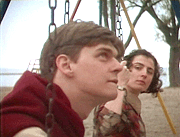A pensive and aimless young man named Peter Foster (Patrick Tierney) lies on his bed listening to his parents’ all too frequent arguments and, attempting to drown out their incessant bickering, turns up the stereo, shuts his eyes, and retreats into his own private and impenetrable world. Concerned over her son’s seemingly frequent disconnection from reality through these episodes of inscrutable playacting, Mrs. Foster (Margaret Loveys) enlists the assistance of a family counselor (Phil Rash) who videotapes his encounter sessions as a means of encouraging the family to review their interaction and gain insight from their objective observation. Peter dutifully returns to the counseling center – not surprisingly, alone – to view the videotapes before the next appointment, but soon finds his attention diverted to the case file of an immigrant Armenian family named Deryan whose son Bedros was given up for adoption years earlier, shortly after arriving into the country, and whose palpable absence still hovers over the emotionally wounded family – perhaps manifesting in the intractably traditional father, George’s (Berge Fazlian) estrangement from his westernized, progressive thinking, artistic daughter Azah (Arsinée Khanjian), the Deryan’s sole remaining child. Captivated by the plight of the Deryan family, Peter, with the counselor’s approval, proposes to leave home – ostensibly to go on a soul-searching trip where he is to periodically chronicle his thoughts on a running audio journal – but instead, initiates contact with George and Sonya Deryan (Sirvart Fazlian) claiming to be the receptive couple’s long lost son.
Marking Atom Egoyan’s first feature film, Nextof Kin a visually assured, lucid, and thoughtful exposition on alienation, displacement, and the amorphous nature of home and family. Incorporating innovative narrative devices of circular structure and video imaging, Egoyan explores the dichotomous role of technology as both a convenient tool for communication and an impersonal barrier to true human connection (a modern-day existential angst that is similarly portrayed in Mike Nichols’ The Graduate, to which Egoyan pays homage in the film’s early sequence): Peter’s voice-over that is visually reinforced by the recurring shots of an airport baggage carousel, reflecting his sense of aimlessness and disorientation; the Foster’s videotaped counseling session that ironically serves, not to facilitate dialogue, but to further alienate the self-conscious Peter from his family; the tape recorder that becomes a literal surrogate to Peter’s articulated thoughts. Furthermore, in illustrating the residual trauma caused the Deryan’s ‘lost’ son Bedros, Egoyan introduces his recurring theme of the absent child – an unresolved emotional fracture that would propel the psychological (and emotional) trajectory of his seminal films, Exotica and The Sweet Hereafter. By exploring the dynamic – and often necessary – function of compassionate role-playing and deception in social and familial relationships, Egoyan creates a haunting and affectionate contemporary humanist fable on identity, impersonation, and connection.
© Acquarello 2004. All rights reserved.
